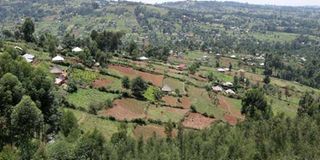Clustered settlements are a promising solution to food insecurity and climate change

An expansive view of part of rural Kisii County. Kisii now ranks among the food insecure counties, according to a new survey. PHOTO | STEPHEN MUDIARI | NATION MEDIA GROUP
What you need to know:
- The Constitution of Kenya partially addresses this issue in section 68. Parliament is supposed to prescribe minimum and maximum land holding acreages.
- When the responses are disaggregated, it becomes apparent that most of those against storied houses are firstly persons who live in areas that still have some land for subdivision.
- Because of the high population density, health standards are at risk, due to lack of proper environmental care, or in its absence, support mechanisms within homes.
From where we stand as a country, there are two extremes of settlements. Counties like Turkana, Isiolo, Kilifi, among others have largely dispersed population settlements. On the other extreme, counties like Kakamega, Nyeri and Kisii are considerably more densely populated.
Those that are in between these extremes are equally quite pressed in receiving adequate government service. Such services include electricity, water and affordable education.
At a policy level, there is need to contemplate clustering settlements and the construction of shared multi-storey houses in order to achieve three goals: mitigate climate change; strengthen food security, and provide an alternative to continued land subdivision.
Obviously, land does not increase, and therefore continued land subdivision in densely populated areas calls for an urgent response. Conversely, our population keeps increasing which means human support must be provided for, and in proportion to, the needs of the population.
Climate change, meanwhile, continues to be largely a Western and elitist debate. Yet the people at higher risk are the smallholder farmers who form the majority of citizens in Kenya, as is the case in many African countries. Even debates around food security seem to be confined to high-level platforms.
Sadly, the increasing population which is mainly engaged in farming is not quite informed of some of the contributory factors that directly impact negatively on their source of livelihood. This is where the problem is.
FOREST PRESERVATION
In densely populated counties there is hardly any land to be further subdivided while still sustaining smallholders. However, customary practices such as land inheritance mean that land subdivision will continue for the foreseeable future.
This means that first, the limited arable land available in Kenya will decrease even further. Second, because of the high population density, health standards are at risk, due to lack of proper environmental care, or in its absence, support mechanisms within homes.
In sparsely populated counties, the challenge is government service delivery. Considering that areas such as Kericho, Kitale and Eldoret that have a substantial chunk of land also serve as water catchment areas, or Taita-Taveta, Kitui, Homa Bay and Turkana which may not have an acute scarcity of land but are struggling to establish proper service delivery mechanisms, clustered settlements where residents live in multi-storied houses arguably will serve both to preserve the natural environment and improve government service delivery.
In Hong Kong, for instance, clustered settlements mean that there is more land available for forest preservation. It also means that service delivery in security and education for example, are easier to provide.
Living in storied houses, as a matter of fact as high as over 20 stories, adds the advantage that services like water, electricity and gas are provided cost-effectively. Here at home, there is an increased visibility of shared, high-rise buildings in Nairobi.
MAXIMUM ACREAGE
Emerging estates tend to concentrate services such as a common shopping centre, with other services such as schools being of a corresponding class.
Just to illustrate, high cost schools are constructed in high cost settlement areas. So aside from rolling it out across the country for the sake of future generations, the idea of clustered settlements is not a new idea.
The Constitution of Kenya partially addresses this issue in Section 68. Parliament is supposed to prescribe minimum and maximum land-holding acreages. However, clustering families and requiring them to live in shared stories houses is indeed a paradigm shift.
Granted that Tanzania experimented with a similar approach in its ujamaa village approach to development and failed, this paradigm can be improved and tested alongside the clustered settlements common in many developed countries to create a better living standard of our people.
In a recent Jesuit Hakimani Centre nationwide survey, when asked if county governments should require families to live in storied houses in order to free land for agriculture, 34 per cent of the respondents were in agreement.
KERICHO, KIAMBU AND KISII
When the responses are disaggregated, it becomes apparent that most of those against storied houses are firstly persons who live in areas that still have some land for subdivision, and secondly people who have not given much thought to the well-being of future generations.
More than 50 per cent of respondents from three counties, Kericho (57.5 per cent), Kiambu (55.7 per cent) and Kisii (52.3 per cent) were in agreement with clustered settlements and living in storied houses, whereas counties like Isiolo (16.7 per cent), Migori (11.1 per cent) and West Pokot (18.5 per cent) were least supportive.
The most insightful finding is that the age category between 25 and 39 years is the most supportive of the idea. Overall, the study shows a great need for planning on how to counter the negative impact of climate change and food insecurity.
It is imperative, therefore, that both the national and county governments reflect deeply on saving our future generations from the risks of climate change unpredictability and their impact on food security.
Dr Mokua is the executive director of the Jesuit Hakimani Centre





